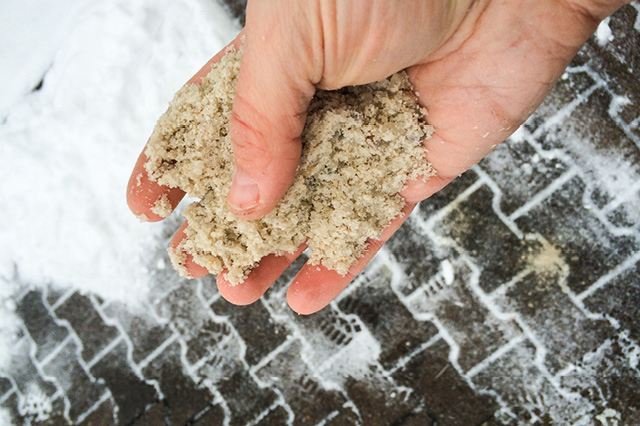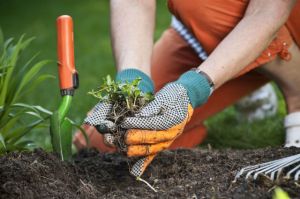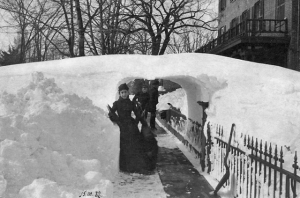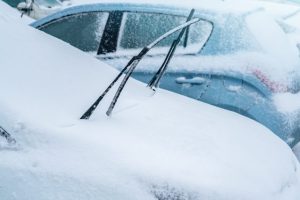As soon as the first snowflake falls, homeowners are already thinking about how to remove the ice and snow from their property. But did you know that snow melt solutions, especially rock salt, can damage your outdoor surfaces?
When spring arrives, and the effects of the brutal winter become more apparent, homeowners are often surprised to see pitted driveways, cracked walkways and deteriorated wood decking.
Here is our guide to the most common forms of ice melt, and the pros and cons of each, according to Consumer Reports.
Calcium Chloride
This is the fastest-acting ice melt of the bunch. If you’re a homeowner in a time crunch, this is the ice melt for you. But be cautious – calcium chloride can harm grass and plants when over-applied, and can cause minimal to moderate damage to asphalt and concrete.
Sodium Chloride
Also known as rock salt, sodium chloride is the most common – and inexpensive – choice. But it’s also the most likely to damage your concrete, asphalt, wooden, brick, stone and metal surfaces. It’s especially dangerous to newer concrete; Consumer Reports recommends that you don’t use rock salt on concrete less than 1 year old. In addition, rock salt is lethal to pets if ingested.
Magnesium Chloride
This is another snow melt to use if you’re pressed for time. It’s environmentally-friendly, safer for pets and more effective than rock salt. However, magnesium chloride can cause even more damage to asphalt or concrete than rock salt.
Potassium Chloride
Pet owners often choose potassium chloride because it’s one of the safer ice melt options. As far as benefits go, potassium chloride is more or less the same as magnesium chloride, but safer for your asphalt and concrete. However, exercise caution if you have a pet with kidney disease; ingesting this ice melt can be lethal to pets that suffer from the disease.
Urea/Carbonyl Diamide
This is also a common snow and ice melt for pet owners. It’s also the least likely to cause damage to your asphalt or concrete, and one of the most inexpensive options next to rock salt. However, it’s the least effective – with urea, you sacrifice efficiency for caution.
Protect your home with homeowners insurance from AAA.
10 Thoughts on “Your Guide to Common Snow Melt Solutions”
Leave A Comment
Comments are subject to moderation and may or may not be published at the editor’s discretion. Only comments that are relevant to the article and add value to the Your AAA community will be considered. Comments may be edited for clarity and length.















SAWDUST: It doesn’t melt the snow ice, but provides a slip-free surface. It’s been in common use for centuries (before the chemical industry started dominating AAA’s “reporting”). Doesn’t damage cement, doesn’t kill your pets. (They can eat it!), and is VERY good for your garden and lawn. It’s usually free from any sawmill, wood shop, lumberyard, or carpenter. Just look out for pressure treated sawdust, which is Very Bad Stuff.
What about kitty litter spread instead on the snowy driveway or paths?
I have a wood burning stove and save the ashes in a bucket to spread on icy areas when I need something to immediately prevent slipping. Easily hosed off when the weather permits.
Why not use thick layer of course-SAND or PLAY SAND for slippery ice and snow-covered walkways..it has fewer or no chemicals! and doesn’t affect the driveway much at all…
Smart! Doesn’t have to be thick to prevent slipping on ice, but does melt as well from thermal effects. Plus salt of any kind is not your plants’ friend except in very limited amounts.
Why do you not provide a printable version of these articles such as the ice melt guide
Hi and thanks for reading Your AAA! We do indeed provide a printing option: if you look under the headline but before the image, you’ll see a bar that includes icons of Facebook, Twitter, LinkedIn, Pinterest and then there’s a little printer icon. I hope that helps.
It would be useful for comments about the impact of each of the above remedies for ice melt on water bodies and wildlife.
How do I track the AAA service call I made this morning(9am, 8Jan)?
Hi Ann!
You can track the progress on the AAA Mobile app, which you can download at AAA.com/MobileApp. You could also call our Roadside Assistance number at 800-222-4357. If you are in an emergency situation, don’t hesitate to call 911 for assistance.
If you’re not able to download the app or call, please feel free to give me your account number and I can check with our Member Relations department to see if they can help.
I hope this helps. Thank you!